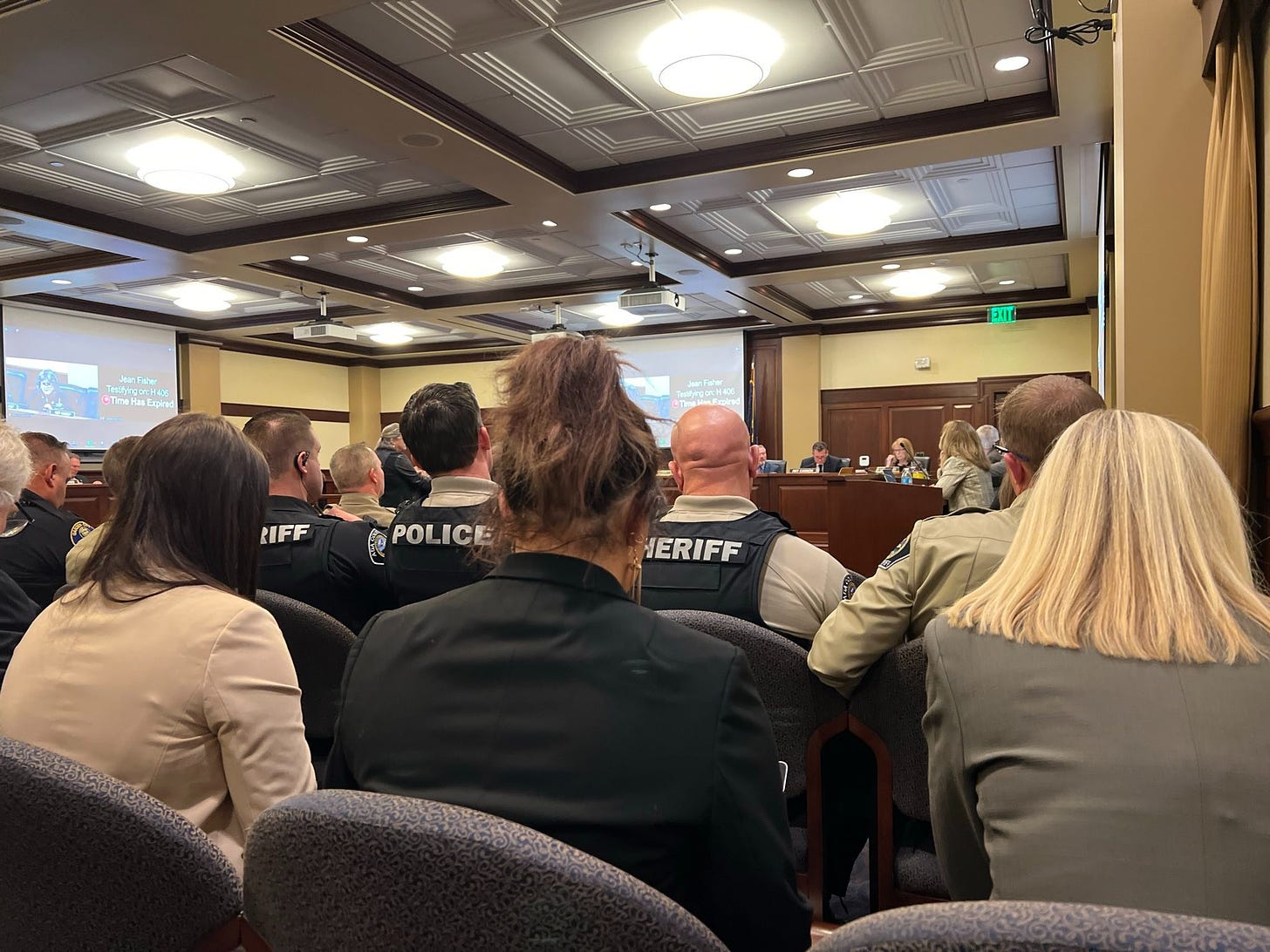Friday morning, I sat through three hours of testimony and discussion in the House Judiciary, Rules, & Administration Committee regarding House Bill 406, which would create mandatory minimum sentences for fentanyl trafficking and overdose deaths.
I live-tweeted the hearing, both for the benefit of those who weren’t there but also to use as notes for this essay. Chairman Bruce Skaug began the hearing by saying that lobbyists on both sides of the issue had been rude and threatening to members of his committee, and he wanted it to stop. Clearly, this is a contentious issue that raises passions on all sides. On one side are police, first responders, prosecutors, and other supporters who warn of the danger of fentanyl trafficking and want something done now. On the other side are defense attorneys, addiction counselors, and those who worry about constitutional overreach who believe the bill, while perhaps well-intentioned, does not respect civil rights or due process.
Unfortunately, this is not an environment where nuance is welcomed. Rep. Ted Hill, one of the bill sponsors, closed his presentation Friday morning by saying “You support law enforcement or you support the drug dealers.” I saw supporters handing out flyers in the committee hearing room with facts about fentanyl that concluded “Back the blue or support drug dealers.”
This kind of rhetoric makes reasoned debate impossible. How can a concerned legislator or member of the public question some detail of the bill without being labeled a drug trafficking apologist or even a murderer? This is the same rhetoric we saw during the Covid-19 lockdowns, where anyone who didn’t wear a mask was accused of wanting to kill their grandparents. It really is despicable, and I’m ashamed that so many people on the right have chosen to engage this way.
Indeed, one of the first people to testify was Meridian Police Chief Tracy Basterrechea who essentially said that anyone who claims to “back the blue” must support this bill. “This is truly a vote on whether or not you support your local law enforcement,” he began. Rep. Julianne Young objected, saying that asking questions about the bill doesn’t mean they don’t “back the blue”. Chairman Skaug agreed, and Chief Basterrechea apologized.
This set the theme of the testimony to follow. While nobody went as far as Basterrechea in impugning motives, the idea that they put forth was that the text of the bill doesn’t matter, the details don’t matter, the potential unintended consequences don’t matter. All that matters is that the Legislature must give law enforcement and prosecutors the tools to combat the fentanyl crisis and then trust them to use those tools wisely.
Is that the right thing to do? Should we give law enforcement a blank check to keep our communities safe?
I have to admit there is something to this idea. Consider the nation of El Salvador, once the murder capital of the Western Hemisphere. President Nayib Bukele came into office promising to crack down on gangs, violence, and drug trafficking, and he did, arresting thousands of gang members and ruthlessly crushing their organizations. Today, El Salvador is one of the safest places in Central America.

It turns out that putting bad guys in jail really does cut down on crime.
On the other hand, the crime rate in Idaho is hardly what it was in El Salvador. We are not at the point where we should be crying out for a strongman to save our streets. Yet to hear the testimonies of law enforcement personnel, that day is just around the corner. Mexican cartels control the market for illicit drugs in Idaho. Fentanyl is cheaply mass produced, both in the jungles of Central America and in hidden places in our own country. This drug is being laced into marijuana, heroin, and even black market pain medication, waiting to kill those who least suspect it.
H406 will not exactly turn Idaho police and prosecutors into Nayib Bukele, so I hope you’ll forgive the comparison. However, it was only a few years ago that we saw Chief Basterrechea’s own police department arrest a mother for taking her children to a city park during the Covid-19 lockdowns. Though Basterrechea was deputy chief of police at the time of that incident, he issued a blistering statement when Attorney General Raúl Labrador moved to dismiss the charges against Sara Brady.
Should the same police departments who persecuted a woman for going to the park be trusted with even more discretionary power?
You see, H406 does more than simply establish mandatory minimum sentences for possessing fentanyl. It significantly alters the balance of power in our criminal justice system. Right now, judges and juries have leeway with regards to how they handle criminals. They have the ability to evaluate each case on its own merits — is this the defendant’s first charge? Is the defendant a minor? Are there extenuating circumstances? Is the defendant an addict who needs help or a trafficker who should be put away?
H406 takes that power away from judges and juries, giving it instead to police and prosecutors. Under this new statute, once a defendant is charged with trafficking fentanyl, judges and juries will find their hands tied with regards to sentencing. The law will compel them to sentence convicts to the mandatory minimum, without regard to extenuating circumstances. It will be up to police and prosecutors to decide who they charge, however. They will have the leeway once granted to judges and juries to file lesser charges or offer plea bargains to suspects facing harsh jail sentences.
Supporters of the bill such as Rep. Hill argue that this is a good thing, that this will give police and prosecutors the tools to not only charge traffickers, but to lean on low level dealers in order to get the kingpins. Ada County Sheriff Matt Clifford, testifying in support of the bill, said that while it would leave some discretion with judges and juries, he believed the balance is currently tipped too far in favor of judges and away from law enforcement and prosecutors.
The biggest sticking point in Friday’s testimony was regarding how the bill defines quantities of fentanyl. Skepticism came from the left and the right, as both Democratic Rep. John Gannon and Republican Rep. Julianne Young expressed concern about the wording of the bill. Starting in 37-2732D, the bill text says:
…any person who knowingly manufactures, delivers, or brings into this state, or who is knowingly in actual or constructive possession of, four (4) grams or more of: alfentanil, as described in section 37-2707(c), Idaho Code; carfentanil, as described in section 37-2707(c), Idaho Code; fentanyl, as described in section 37-2707(c), Idaho Code; norfentanyl, as described in section 37-2707(c), Idaho Code; remifentanil, as described in section 37-2707(c), Idaho Code; sufentanil, as described in section 37-2707(c), Idaho Code; fentanyl-related substances, as described in section 37-2705(b), Idaho Code; or any mixture or substance containing a detectable amount of any such substance is guilty of a felony, which felony shall be known as “trafficking in fentanyl.” If the quantity involved:
(1) Is four (4) grams or more but less than fourteen (14) grams, or if such substances are in pill form, consist of one hundred (100) pills or more but fewer than two hundred fifty (250) pills, such person shall be sentenced to a mandatory minimum fixed term of imprisonment of three (3) years and fined not less than ten thousand dollars ($10,000)
It’s the last clause of the first paragraph that concerned both Gannon and Young. Rather than having language that requires prosecutors to prove that a suspect intended to distribute his illicit drugs, the bill sets mandatory minimum sentences based on the quantity of fentanyl the suspect is caught with. However, it’s not just the quantity of fentanyl, but the quantity of any substance that has a detectable amount of fentanyl in it.
Near the beginning of the hearing, former Jerome County Sheriff’s Deputy Mike Pohanka testified in support of the bill. When Rep. Young asked if someone was caught with a few grams of marijuana that was laced with fentanyl, and was aware there was fentanyl present, would that person be charged under this statute? Pohanka answered “I should hope so.”
However, later in the hearing, one of the primary sponsors of the bill, Rep. Chris Allgood, asked if someone caught with five grams of marijuana that was laced with fentanyl would be charged as if he or she had five grams of fentanyl, as the statute allows. Sheriff Clifford answered “No.”
Twin Falls prosecuting attorney Grant Loebs struck a similar note. When Rep. Gannon asked if someone with four grams of marijuana in which there was a the tiniest amount of detectable fentanyl would be charged as a trafficker according to this statute, Loebs said that the law would allow it, but he wouldn’t charge someone that way.
The distinction seems to hinge on the word “knowingly”. Yet how are police and prosecutors supposed to divine whether or not someone carrying a bag of marijuana knew that it had fentanyl in it? Indeed, Rep. Young asked Prosecutor Loebs why they shouldn’t add concrete language to the bill that requires police and prosecutors to prove intent, and he admitted that it would make his job virtually impossible.
Sheriff Clifford agreed. Rep. Chris Mathias asked him why not clarify the intent language in the bill to deal with potential unintended consequences, and Clifford replied that the law can’t account for every possible situation. He said “the law is a guideline” for police and prosecutors, and it’s up to them to choose how to apply it.
That brings us back to what I believe is the central question of this bill. Should we give police and prosecutors tremendously expanded powers to deal with the growing fentanyl crisis and trust that they will use those powers wisely?
Loebs said that the point of this bill was to put this language into statute and let drug traffickers know that doing business in Idaho was no longer a good idea. This seems to me to be the Bukele philosophy in miniature. Is that the only way to deal with this growing problem?
Underlying this question are deeper ideas about the role of law enforcement in the political process. Conservatives naturally trust the police (though many are starting to question law enforcement with regards to the way in which J6 attendees and Covid mask scofflaws were treated). For many Republican voters, the stamp of approval from the Fraternal Order of Police or Code 3 to 1 is all they need to know. Yet our society wisely subordinates law enforcement to oversight from civilian elected officials who will sometimes push back on requests from law enforcement.
In 2022, the Idaho State Police requested nearly $7 million to purchase and maintain a helicopter. Sen. C. Scott Grow, then a member of the Joint Finance-Appropriations Committee (JFAC), suggested that it would be cheaper to contract for aviation services when needed rather than simply giving the police what they asked for. JFAC agreed, removing the helicopter from the budget.
Does this mean that Sen. Grow and his colleagues who rejected the request are anti-police? Of course not. No single sector of our government should have ultimate power over the rest, not even law enforcement. We need the debate, the give and take, and demanding such doesn’t make us anti-police or pro-drug dealers, rather it means we are being wise stewards of our state’s resources and of the law.
Of course, fentanyl trafficking is not the only subject of this bill. It also adds mandatory minimum sentences for what it calls “drug-induced homicide,” that is, it gives the ability to charge people with murder if they give drugs to someone who then dies of an overdose.
Rep. Barb Ehardt showed the most skepticism of this provision, wondering how police and prosecutors would decide who was the guilty party if drugs were passed around by multiple people. She also wondered how they would know which drug was fatal if someone had taken more than one.
Former chief deputy of the Ada County Prosecutor’s Special Crimes Unit and current Idaho state director for Right On Crime Jean Fisher testified against the bill because of the drug induced homicide provision. She explained the different categories of homicide charges already on the books, saying that drug induced homicide was similar to involuntary manslaughter yet much harder to prove.
It was interesting to see which communities supported the bill and which had concerns. Police and prosecutors supported it, obviously, and several local officers and sheriff’s deputies sat in the front two rows in full uniform and kit.

On the other hand, a former gang member who now works to help those who are addicted to drugs testified against the bill, saying that mandatory sentences can turn addicts into hardened criminals. Dennis and Susan Mansfield shared the story of their son who died due to his drug addiction, saying that he needed rehabilitation, not prison time.
Mikela French of the Idaho Association of Criminal Defense Lawyers called the bill a sledgehammer in a situation that needs a scalpel instead.
None of this is to say that the problems raised by the bill’s supporters don’t exist. I’ve written before about the scourge of fentanyl and other synthetic opioids coming across our borders and flooding our streets. The opioid crisis is killing a hundred thousand Americans each year and gutting rural communities across our country. However, I have to ask why so many people are abusing drugs like fentanyl in the first place. What is it about our society that is driving so many people to try to find relief from the pain of their lives? Will those problems be solved by adding fentanyl to the list of drugs that earn mandatory minimum sentences?
The idea of mandatory minimums for drug trafficking has been around for more than thirty years. Has drug abuse, and the crime and tragedy associated with it, gotten better or worse since then? At the end of the hearing on Friday, Rep. Chris Mathias started down a rabbit trail, bringing up the crack cocaine epidemic of the 1980s and suggesting we should be careful about giving in to fear and ignoring unintended consequences. As odd as it is for me to agree with a left wing Democrat, I think he’s on to something there. The law enforcement community is clearly selling this bill based on fear — fear of a loved one dying of an inadvertent overdose, fear of drugs driving crime that could affect your family and community.
That’s not to say that supporters of the bill are wrong, rather I believe that we must look dispassionately at any potential law to make sure we’re not creating more problems than we solve. Idaho Freedom Foundation rated the bill -4 because of issues related to civil and constitutional rights, and author Parrish Miller went into greater detail on his own website. This bill as written is troubling in several ways, and our lawmakers need to very carefully weigh out the potential consequences before adding this to our statutes.
For someone like Rep. Hill, who spent nearly four decades in the military, that can seem like a waste of time. In the military, soldiers carry out their orders in pursuit of a tangible goal. In politics, however, we must consider the unintended consequences that a law might create. If that means that lawmakers must go back to the drawing board a few times, then so be it. Once a law is on the books it is harder to fix than it is when it is still going through the legislative process.
That said, most voters don’t pay attention to these details. Blaine Conzatti, president of the Idaho Family Policy Center, testified that his organization polled Idahoans about stronger laws for drug trafficking and found a vast majority supported such legislation. These voters want to see action, they want to see their representatives do something. They are not concerned with the nitty gritty details. Even if lawmakers have good reasons for voting against this bill on the floor, that vote will be portrayed as a slap in the face to law enforcement and a statement of support for drug dealers.

I hope that the law can be amended before reaching the floor, but if not, I hope that police and prosecutors use wisely the powerful weapon we are placing into their hands. I would be happy to look back in five years and say that my concerns were unfounded and that this new law has been an unqualified success in making our communities safer. Nevertheless, “pass and pray” is a troubling way to create laws for our state. Over the top rhetoric is no substitute for reasoned debate.
The committee will vote on H406 on Tuesday afternoon. Make sure you’re subscribed and have bookmarked the Session Snapshot for the latest updates.
Paid subscribers, visit Substack for a bonus note!












One Comment
Comments are closed.